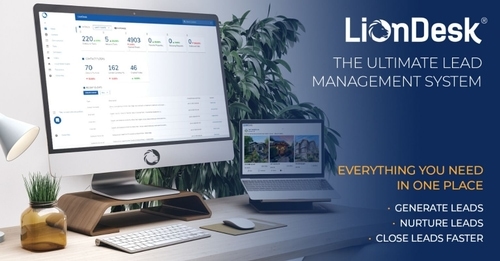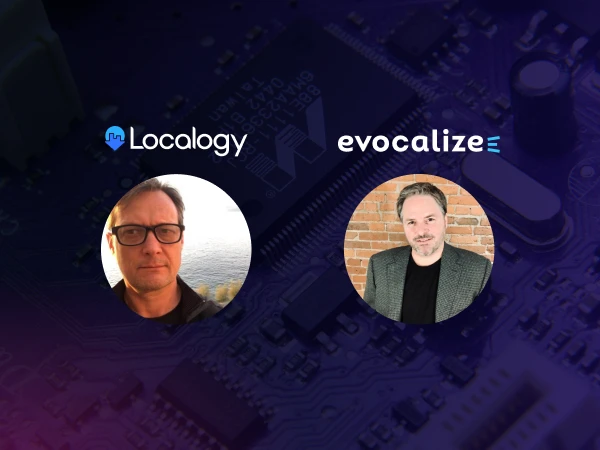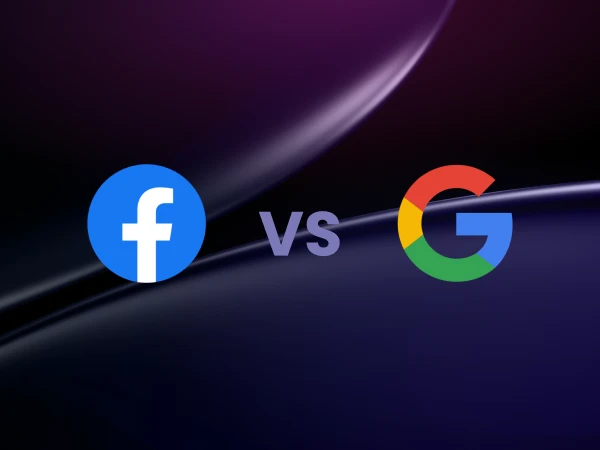
Facebook ads vs Google ads for multi-location businesses
Share
Schedule a 30-min marketing strategy call with our team
With digital marketing, choosing the right advertising platform can feel like navigating a complex maze, especially for businesses managing multiple locations. Are you wrestling with the decision between Facebook ads vs Google ads? You’re not alone. Many businesses find themselves at this crossroads, seeking the most effective way to drive growth across various locations.

A common digital dilemma
If you’re a multi-location business owner, we understand the challenge you face with digital marketing. You likely manage dozens of locations across various regions. You know you need to have an online presence and run digital ads, but handling all of those campaigns can quickly become overwhelming and chaotic.
We’ve seen many business owners end up choosing the wrong platform or running ineffective ads because it’s hard to optimize properly and there are so many moving parts. This leaves you feeling frustrated as you watch your ad spend go to waste. The dream of driving growth and visibility to each of your locations starts to feel out of reach.
We get it – it’s an extremely common struggle. But there is a solution…

A story that echoes your experience
Let me tell you about John, who owns a regional fast food franchise with over 50 locations. He knew he wanted to amplify his digital marketing efforts to drive growth, but every time he tried to manage campaigns for each individual location, things spun out of control fast.
He started by hiring digital marketing freelancers, but found it impossible to oversee what they were doing across so many different regional campaigns. The results ended up disjointed and ineffective.
Next he tried tackling it in-house, but between optimizing budgets, creatives, targeting, and more – it was too much for his small marketing team to handle.
After 6 frustrating months of wasted ad spend and stagnant growth, John felt overwhelmed and ready to give up. He lost count of how much money he had thrown away at this point.
Worst of all, John’s regional managers started complaining that competitors were clearly outmarketing them in their local areas. His multi-location digital marketing strategy was actually doing more harm than good.
This story might seem overexaggerated, but there’s definitely some truth to the feelings you can have trying to set up digital marketing. Luckily, we’re here to help!
Quick overview of Facebook ads vs Google ads
When it comes to deciding whether to focus your digital advertising efforts on Facebook ads vs Google ads (or both), there is no universal “right” answer across every business type and situation. However, there are a few key factors multi-location marketers should consider when allocating ad spend between these two dominant platforms.

Facebook ads
- Pros:
- Vast reach: Access to a large and diverse audience.
- Detailed demographics: Advanced targeting options based on interests, behaviors, and demographics.
- Visual impact: Leverage images and videos for greater engagement.
- Cons:
- Lower purchase intent: Users are not actively seeking products, more passive engagement.
- Content quality: Requires high-quality, engaging content to stand out.
- Ad fatigue: Potential for users to become desensitized to ads.
- Best practices:
- Engaging creatives: Use eye-catching visuals and compelling narratives.
- A/B testing: Test different ad formats and content to see what resonates best.
- Retargeting: Utilize retargeting to nurture leads and increase conversions.
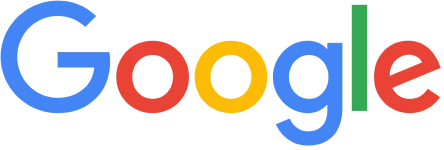
Google ads
- Pros:
- High-intent audience: Users actively searching for specific products or services.
- Targeted reach: Precise targeting based on keywords and search queries.
- Measurable performance: Detailed analytics to track ad performance and ROI like Audience Insights.
- Cons:
- Cost considerations: Can be expensive, particularly for competitive keywords.
- Learning curve: Requires understanding of SEO and keyword research.
- Constant monitoring: Needs regular optimization for best results.
- Best practices:
- Keyword optimization: Use relevant, high-performing keywords.
- Ad copy relevance: Ensure your ad copy is clear and directly relates to the search query.
- Landing page alignment: Direct users to a landing page that matches their search intent.
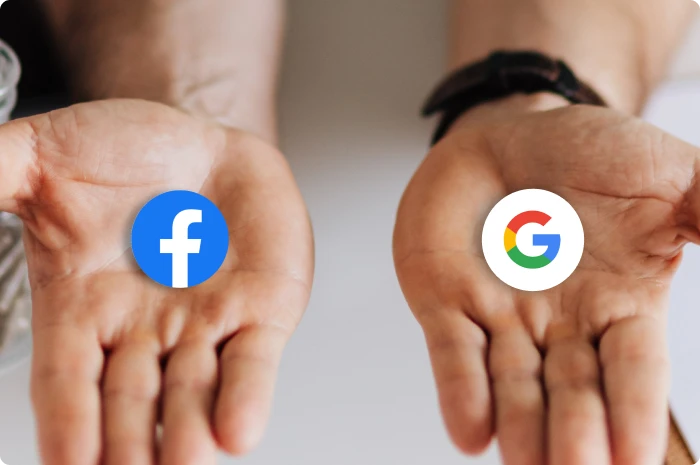
Choosing between Facebook vs Google – What’s best for multi-location marketers?
Now that you have a general overview of the strengths and weaknesses of Facebook ads vs Google ads, here is a good rule of thumb:
When deciding where to focus your digital advertising efforts, consider both your campaign objectives and your business’s core audience. If you are focused on increasing awareness and exposing your brand to new audiences who may not yet know they have a need, Facebook’s massive reach across demographics can be very effective.
However, if you are focused directly on driving conversions by targeting those actively searching for your products or services, Google Ads paired with hyper-localized targeting tends to provide the highest intent customers.
Google ads for direct response:
- Ideal for businesses offering solutions to immediate needs or specific services.
- Great for driving conversions with a clear call to action.
Facebook ads for branding and engagement:
- Perfect for building brand awareness and establishing a connection with your audience.
- Effective for storytelling, community building, and long-term brand loyalty.
For most multi-location brands, a strategic combination of Facebook and Google Ads with geography-based targeting, all managed under the umbrella of a streamlined campaign management solution like Evocalize, provides the best overall results (we’ll get to that in the next sections). Evocalize can help determine the ideal budget allocation across platforms and locations based on past performance and machine learning optimizations.
Trackability & optimization
One of the biggest challenges of managing digital ads across dozens of locations is being able to accurately track what’s working at each individual store. Without proper attribution, it’s impossible to optimize campaigns effectively.
Fortunately, both Facebook ads vs Google ads provide excellent analytics dashboards for monitoring key campaign metrics like clicks, impressions, conversions, and more. Facebook does have the edge for more granular demographic reporting. And with UTM campaign tracking codes, multi-location businesses can segment performance by region.
This enables easy optimization of creative, messaging, budgets, and targeting for each locale based on real attributable data. Optimization is what takes average campaigns and makes them extremely profitable. With proper analytics set up, both platforms allow for optimization, but hands-on management can still prove challenging for large franchise businesses.
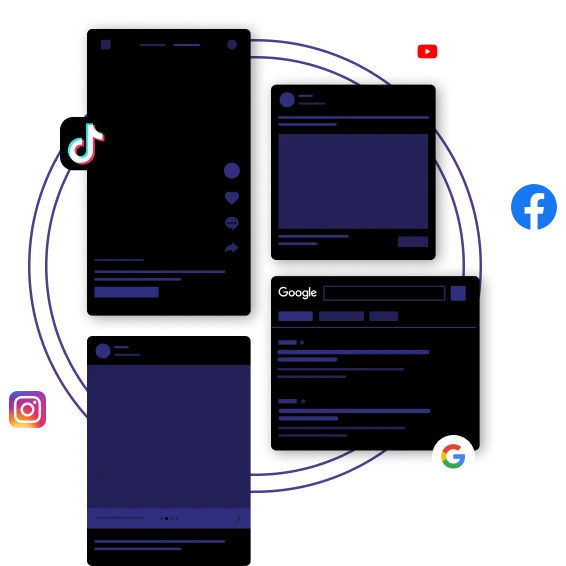
Effortlessness through automation
Like John learned, managing such a high volume of hyper-targeted campaigns on your own just isn’t realistic. But what if you had an intuitive platform like Evocalize that lets you deploy beautifully designed Google and Facebook campaigns to every location with just a few clicks?
Evocalize’s geo-localized ad templates handle all the heavy lifting – from budgeting to targeting to creative to optimization. Our system uses machine learning and performance data from across franchise networks to algorithmically determine the best platforms and strategies to drive results for each individual location.
Now local store owners can simply launch compliant, on-brand digital ads that are proven to connect with customers in their communities. Corporate HQ has oversight to ensure consistency. No marketing experts required.
This automation empowers both corporate leadership and individual franchises while eliminating the typical headaches of multi-channel, multi-location digital advertising.
FAQs: Facebook ads vs Google ads
- Is it better to focus on one platform over the other?
- It depends on your specific business goals and target audience. A balanced approach often yields the best results.
- It depends on your specific business goals and target audience. A balanced approach often yields the best results.
- How does Evocalize fit into my marketing strategy?
- Evocalize empowers you to launch tailored, optimized campaigns across multiple channels effortlessly, maximizing efficiency and growth.
- Evocalize empowers you to launch tailored, optimized campaigns across multiple channels effortlessly, maximizing efficiency and growth.
- What are the key differences between Facebook ads vs Google ads?
- Google ads are search-based and excellent for targeting high-intent users, while Facebook ads are ideal for demographic and interest-based targeting, suitable for brand building and engagement.
- Google ads are search-based and excellent for targeting high-intent users, while Facebook ads are ideal for demographic and interest-based targeting, suitable for brand building and engagement.
- Which platform is more cost-effective, Facebook ads vs Google ads?
- The cost-effectiveness depends on your campaign goals and target audience. Generally, Facebook ads might have a lower cost per click, but Google ads can offer a higher conversion rate.
- The cost-effectiveness depends on your campaign goals and target audience. Generally, Facebook ads might have a lower cost per click, but Google ads can offer a higher conversion rate.
- Can I target specific locations with both Google and Facebook ads?
- Yes, both platforms offer robust geo-targeting options, allowing you to tailor your campaigns to specific locations.
- Yes, both platforms offer robust geo-targeting options, allowing you to tailor your campaigns to specific locations.
- How do I ensure brand consistency across different ad platforms?
- Use centralized campaign management tools like Evocalize to maintain consistent messaging and branding across all platforms.
- Use centralized campaign management tools like Evocalize to maintain consistent messaging and branding across all platforms.
- What type of content works best on Facebook ads?
- Engaging and visually appealing content, such as high-quality images and videos, along with compelling storytelling, works best on Facebook.
- Engaging and visually appealing content, such as high-quality images and videos, along with compelling storytelling, works best on Facebook.
- How important are keywords in Google ads?
- Keywords are crucial in Google Ads as they determine when your ads will be shown. It’s essential to choose relevant and high-performing keywords.
- Keywords are crucial in Google Ads as they determine when your ads will be shown. It’s essential to choose relevant and high-performing keywords.
- Can I use the same ad content on both Facebook ads vs Google ads?
- While you can use similar themes, it’s advisable to tailor the content to fit the format and audience of each platform.
- While you can use similar themes, it’s advisable to tailor the content to fit the format and audience of each platform.
- How do I measure the success of my campaigns on both platforms?
- Use the analytics tools provided by each platform to track metrics like click-through rates, conversion rates, and ROI. Evocalize can also provide comprehensive analytics across platforms.
- Use the analytics tools provided by each platform to track metrics like click-through rates, conversion rates, and ROI. Evocalize can also provide comprehensive analytics across platforms.
- What should I consider when setting a budget for each platform?
- Consider your campaign objectives, target audience, and expected conversion rates. Allocate your budget based on the platform that aligns best with your goals.
- Consider your campaign objectives, target audience, and expected conversion rates. Allocate your budget based on the platform that aligns best with your goals.
- How often should I update or change my ad campaigns?
- Regularly review campaign performance and update your ads based on data-driven insights. This could be anywhere from weekly to monthly, depending on the campaign’s nature.
- Regularly review campaign performance and update your ads based on data-driven insights. This could be anywhere from weekly to monthly, depending on the campaign’s nature.
- Can I use these platforms for retargeting campaigns?
- Yes, both Google ads and Facebook ads offer powerful retargeting capabilities to re-engage users who have interacted with your brand.
- Yes, both Google ads and Facebook ads offer powerful retargeting capabilities to re-engage users who have interacted with your brand.
- How do I handle negative feedback or comments on Facebook ads?
- Monitor your ad comments regularly and respond professionally to negative feedback. Use it as an opportunity to improve customer relations and brand image.
- Monitor your ad comments regularly and respond professionally to negative feedback. Use it as an opportunity to improve customer relations and brand image.
- What is the best approach for a multi-location business using both platforms?
- Develop a strategy that leverages the strengths of each platform for different purposes, like using Google ads for direct response and Facebook ads for brand awareness. Utilize Evocalize to streamline management and optimize campaigns across locations.
Embrace your digital future
Reflect on your current marketing strategy. Are you facing challenges similar to John’s? How could a more streamlined, data-driven approach transform your business?
If you want to simplify your digital marketing and drive consistent growth across all your locations, learn more about Evocalize. Let’s revolutionize your marketing strategy together.
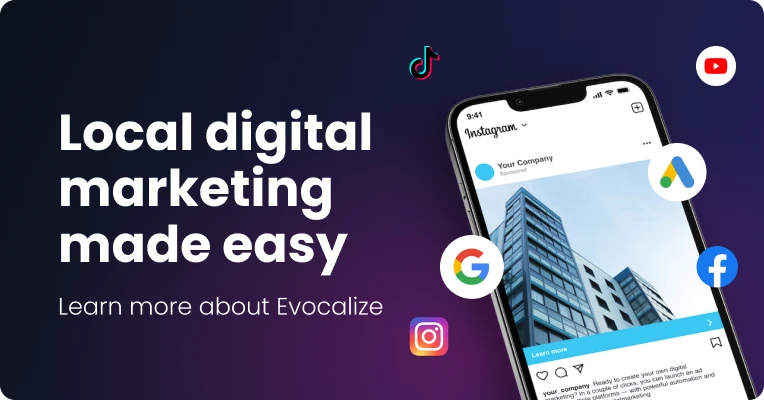
Share
Subscribe to our blog
Don’t miss a beat in the fast-changing local digital marketing landscape — sign up to stay ahead of the curve!

